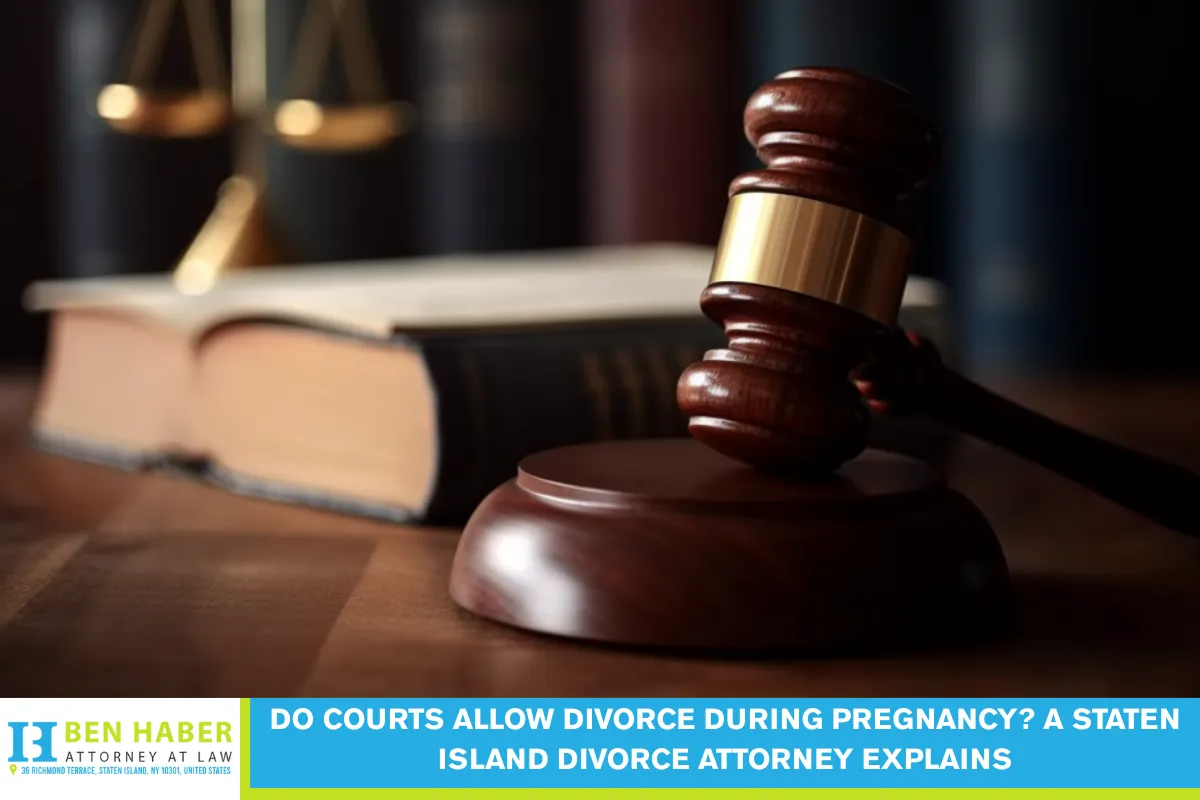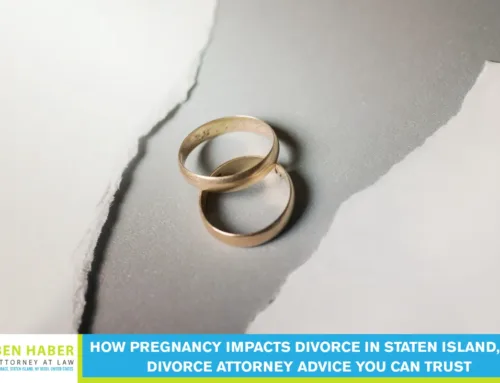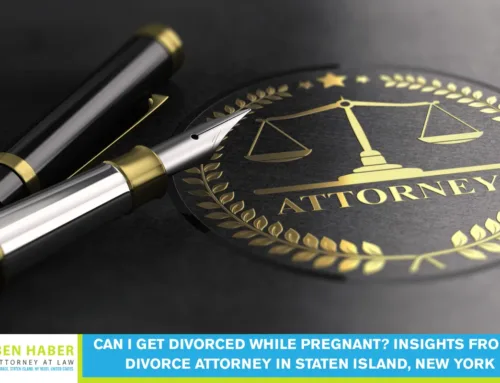Divorce attorney services are often sought during life’s most stressful moments, and few situations are more emotionally charged than the breakdown of a marriage during pregnancy. In Staten Island, New York, this scenario raises many legal and practical questions that can feel overwhelming. One of the most common concerns is whether a couple can legally end their marriage before the baby is born—and what that means for both parents and the child.
Understanding how courts in Staten Island approach divorce during pregnancy is important for anyone navigating this challenging life event. While the law doesn’t specifically prevent couples from divorcing during this period, the process is rarely simple. Legal procedures must consider the health and needs of the pregnant spouse, the future child, and the responsibilities of both parties. This article will guide you through the intricacies of this situation from a local legal perspective.
The Legal Possibility of Divorce While Pregnant in Staten Island

In New York State, there are no laws that prohibit a couple from filing for divorce during pregnancy. The legal right to dissolve a marriage applies regardless of whether a child is already born. However, the practical side of this process becomes more complicated due to the rights of the unborn child and the court’s obligation to consider their welfare.
Divorce proceedings involve decisions on major issues, including property division, child custody, child support, and spousal maintenance. When a baby is on the way, some of those decisions can’t be finalized until after the child is born. This doesn’t stop the divorce from being filed or from progressing, but it may delay the final judgment.
Why Pregnancy Makes Divorce More Complicated in Court

Pregnancy adds emotional, physical, and legal layers to any divorce. Courts in Staten Island, and throughout New York, place a strong emphasis on protecting the best interests of the child—even before birth. This means the court will proceed cautiously to ensure that all issues related to the unborn child are handled fairly and responsibly.
Custody and Visitation Can’t Be Determined Until Birth
The court can’t assign legal or physical custody to someone who has not been born yet. Once the child is born, both parents’ abilities to provide a stable home, proper medical care, and emotional support can be assessed. Until then, custody discussions remain theoretical, and judges often hold off on issuing final custody rulings.
Child Support Calculations Require a Legal Child
Child support can’t be ordered for an unborn child. After birth, the court can determine financial responsibilities based on each parent’s income and the child’s needs. Suppose the parents are not married at the time of birth. In that case, establishing legal paternity may be necessary before support is finalized.
Emotional and Health Considerations Are Taken Seriously
The court may consider the pregnant spouse’s physical and emotional condition, especially if the other spouse’s behavior is harmful. Any history of domestic violence, neglect, or psychological abuse could affect temporary arrangements and future custody decisions. Judges want to ensure that neither the pregnant spouse nor the baby is exposed to unsafe conditions during or after pregnancy.
Starting the Divorce Process While Expecting
Initiating a divorce during pregnancy in Staten Island follows the same steps as any other divorce, though additional considerations are involved. The spouse seeking divorce must file a Summons and Complaint with the Supreme Court of Richmond County. Once filed, the other spouse is formally served and has the opportunity to respond.
This process can move forward even if both parties don’t agree. In a contested divorce—where one spouse disagrees with the filing—the court will still hear the case and make determinations based on evidence, testimony, and New York’s divorce laws.
Judges may issue temporary orders to ensure that both spouses and the unborn child are protected.
These can include:
- Temporary financial support
- Exclusive use of the marital home
- Orders related to health insurance and prenatal care
These temporary measures remain in place until the final judgment, which may occur after the baby is born.
How the Courts Handle Child-Related Issues Before Birth

Because a divorce during pregnancy often centers around future parental responsibilities, courts use caution in finalizing child-related matters until the child is born.
Establishing Paternity
If the couple is married, New York law assumes the husband is the child’s legal father. However, in cases involving infidelity or if the couple was separated during conception, paternity might need to be confirmed through DNA testing. This can’t happen until after the child is born.
Making Custody Decisions
Courts base custody decisions on what’s best for the child. After the baby is born, the judge will examine:
- Each parent’s living situation
- Income, employment, and availability
- Ability to meet the child’s emotional and physical needs
Until then, custody remains pending. Judges typically do not assign custody rights or visitation schedules for unborn children.
Planning for Child Support
Once paternity is established, the court uses New York’s Child Support Standards Act to calculate the non-custodial parent’s payment. This is typically a percentage of their income, adjusted according to the number of children they have and other relevant financial obligations.
The Court’s Focus on the Best Interests of the Child
In every family law case involving children, the court’s primary concern is the child’s best interest. When pregnancy is involved, the unborn child is considered a future dependent whose welfare must be protected. Judges carefully evaluate whether the divorce, custody arrangements, and financial agreements will provide a secure and stable environment for the baby once born.
This may result in the court pausing or slowing down the divorce process. The judge wants to ensure that no decisions are made prematurely or without considering the impact on the baby.
Emotional and Financial Challenges of Divorce During Pregnancy

Beyond the legal process, divorcing while expecting a child can cause emotional distress and financial strain.
Pregnant individuals often face:
- Changes in living arrangements
- Increased medical needs
- Emotional stress from parenting alone
Spouses must also think about how to prepare financially for birth-related expenses and raising a child in a single-parent household. For these reasons, some people choose to file for legal separation rather than a full divorce, pending the birth of the baby, although this decision depends on each couple’s specific circumstances.
Legal separation can address many of the same issues as divorce, such as support and property division, but without dissolving the marriage. It can be a temporary solution for couples who need distance and clarity during this major life change.
What Happens If One Spouse Doesn’t Want the Divorce?
A common scenario involves one partner resisting divorce during pregnancy, either out of emotional attachment or concern for the unborn child. However, in New York, one spouse can’t legally prevent the other from pursuing a divorce. Even if contested, the process will move forward under the court’s guidance.
The resisting spouse can express their concerns during hearings, and the judge will weigh their statements along with the evidence. However, emotional resistance alone is not enough to stop a legal dissolution of marriage.
Finalizing the Divorce After the Baby Is Born

Most divorce cases involving pregnancy in Staten Island aren’t finalized until after the child is born.
Once the baby arrives, the court can:
- Confirm legal parentage
- Establish custody schedules
- Issue child support orders
From there, the final judgment of divorce can be issued. The judge ensures that no essential matters are left unresolved and that both the child and the parents have a clear understanding of their future responsibilities.
Moving Forward After Divorce During Pregnancy
Navigating divorce while expecting a child requires strength, legal knowledge, and emotional resilience. Whether the decision to separate was mutual or one-sided, the reality of parenting on your own—or co-parenting with an ex-spouse—starts as soon as the baby is born. Courts strive to make this transition as smooth as possible, but thorough preparation and legal guidance are essential.
Focusing on your future, your child’s health, and your well-being will help you make the best decisions during this time. With the right support and understanding of the legal process, you can begin a new chapter with confidence and clarity.
Staten Island Divorce Attorney – Benjamin Haber

Looking for a divorce attorney in Staten Island who can help you through one of the most stressful times of your life? The Law Office of Benjamin Haber offers the support, guidance, and experience you need when dealing with divorce during pregnancy. We understand how overwhelming this process can feel, especially when you’re trying to protect your future and your child’s well-being at the same time. That’s why we handle every case with care, patience, and attention to detail. Whether your situation is simple or complex, we’ll guide you through each step clearly and ensure your rights are fully protected. Our team is familiar with the Staten Island courts, and we’ll ensure you’re prepared, informed, and confident throughout the process. We don’t believe in cookie-cutter solutions—we take the time to understand your situation and fight for what’s fair.
Contact us today at (718) 442-0960 – we’re here to help you move forward with confidence.
Frequently Asked Questions About Divorce During Pregnancy in Staten Island
1. Can a judge issue a custody agreement before a child is born?
No, the court cannot finalize a custody agreement until the child is born. While the Supreme Court in Staten Island may allow discussions about future parenting responsibilities during the divorce process, legal custody orders are not enforceable until after birth. That’s because fetal viability—the point when a fetus could survive outside the womb—does not give the unborn child separate legal standing for custody. After birth, both parents can enter into a parenting plan, which outlines custody, visitation, and decision-making responsibilities. This plan must then be reviewed and approved by a family law attorney and presented to the court for judicial approval. Judges focus on the child’s best interests and typically consider factors such as parenting ability, financial position, emotional stability, and the presence of domestic violence or emotional abuse when issuing final orders.
2. What happens if there is a denial of paternity during the divorce?
Suppose a spouse claims that they are not the genetic father of the unborn child. In that case, this is considered a denial of paternity. Even in marriage, New York law provides a legal presumption that the husband is the father of the child. However, this presumption can be challenged. A paternity test may be ordered after the baby is born to confirm or disprove biological ties. These cases often involve sensitive topics, such as reproductive abuse or forced marriage, where a partner may have had limited control over reproductive decisions. The court requires legal documents, medical records, and affidavits as part of the court proceedings to resolve the dispute. Once paternity is confirmed or disproved, the judge can move forward with decisions on child support, custody, and visitation. Suppose paternity is denied and confirmed by DNA. In that case, the husband may not be held responsible for child support court orders unless another legal relationship is established.
3. Can the court issue a restraining order during pregnancy-related divorce?
Yes. The Supreme Court in Staten Island can issue a restraining order if there is credible evidence of emotional abuse, domestic violence, or threats of harm—especially during pregnancy. This is a critical protection for the pregnant spouse and the unborn child. A restraining order, also called an order of protection, can include terms like no-contact requirements, removal of the abusive partner from the home, or restrictions from approaching medical appointments or childcare spaces. In cases involving reproductive abuse, where a partner exerts control over pregnancy decisions, the court takes swift action to ensure safety. These orders are initially temporary but can be extended during ongoing court proceedings. It’s important to report any abusive behavior to law enforcement or a family law attorney, who can file the necessary paperwork quickly. Judges do not hesitate to act when maternal safety or maternal mortality risks are involved.
4. How does the court handle division of marital assets when a child is on the way?
The presence of an unborn child does not change the way the court divides marital assets. Still, it may influence how certain resources are allocated. In New York, divorce law requires an equitable—not equal—division of all jointly owned property. This includes homes, vehicles, retirement accounts, and savings acquired during the marriage. Suppose one spouse is pregnant and will have more caregiving responsibilities after birth. In that case, the court may adjust the financial position of each party when dividing assets. Factors such as spousal support, access to health insurance, and the cost of future child care are all considered. Suppose domestic violence, child marriage, or forced marriage is part of the case history. In that case, it can also affect how resources are split. A qualified divorce attorney will help gather the necessary legal documents to present a strong financial picture to the court. Each case is unique, and the judge will weigh all circumstances carefully before issuing a final order.
5. Is spousal support affected if the pregnant spouse isn’t working?
Yes, spousal support—also called maintenance—is often influenced by a spouse’s employment status. In situations where the pregnant spouse is unable to work due to health concerns, lack of maternity leave, or limited earning capacity, the court may award temporary or long-term support. New York’s Supreme Court uses a set formula to calculate support. Still, it may adjust the amount based on the specific facts of the case. Judges consider the length of the marriage, current income levels, and anticipated caregiving duties. If the pregnancy was the result of reproductive abuse or if emotional abuse has impacted the spouse’s ability to work, those factors are taken into account. The court aims to ensure that both parties can maintain a reasonable standard of living after divorce, particularly when a child is involved. Your family law attorney will work with you to document your needs and create a support request that accurately reflects your situation.
Read more: How Pregnancy Impacts Divorce in Staten Island, NY: Divorce Attorney Advice You Can Trust






